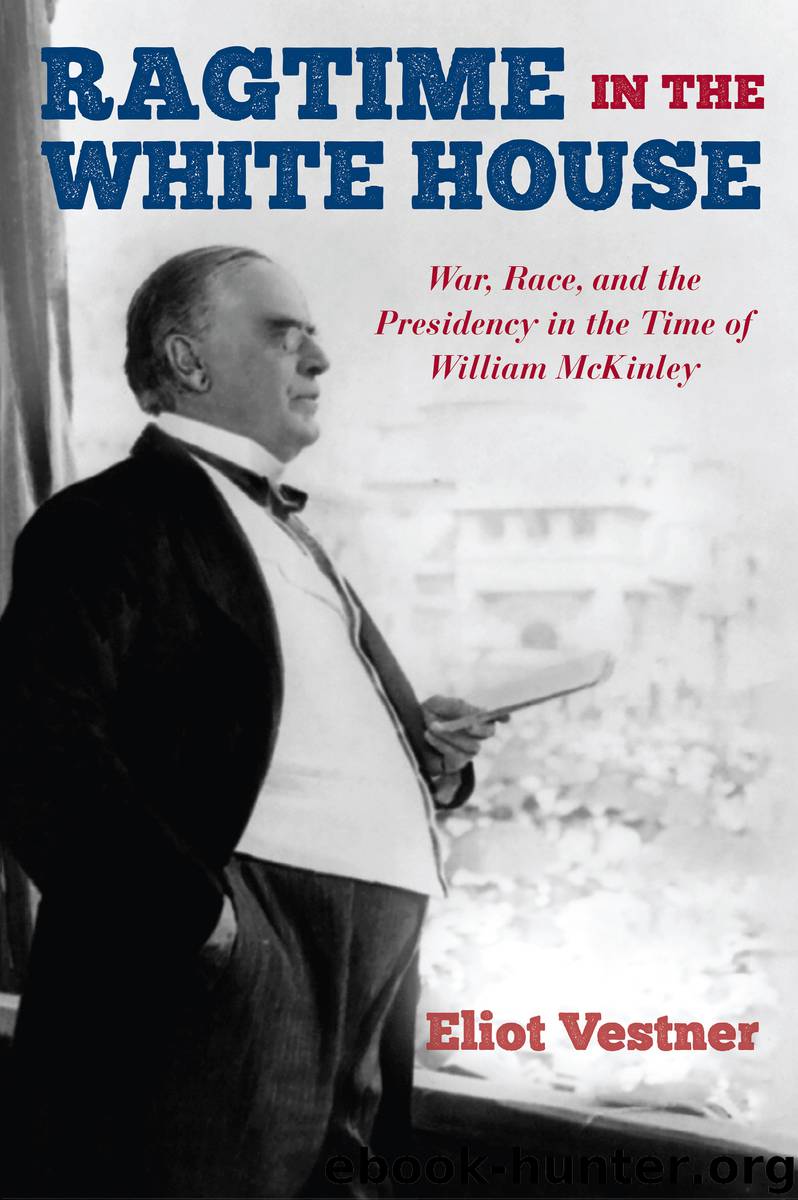Ragtime in the White House by Eliot Vestner

Author:Eliot Vestner
Language: eng
Format: epub
Publisher: City Point Press
Published: 2020-05-06T19:13:11+00:00
Chapter 25
Hawaii
“We cannot let those islands go to Japan . . . Her people are crowding in there.” William McKinley
At the beginning of the war, France and Germany had demanded that Hawaii, as a neutral nation, bar U.S. warships from Pearl Harbor, and they had the naval power to back up their demands. But Hawaiian neutrality was unthinkable; it would deprive the United States of a strategically important base for ships bound to and from Manila.1 It would also pose a potential threat to the West Coast should Germany or Japan acquire the islands.
• • •
The United States had a history in Hawaii. In 1843, President John Tyler, alarmed by European interest in Hawaii, extended the Monroe Doctrine to the islands, bringing them under American protection which, at that time, wasn’t worth much. The principal American activities in the islands were whaling and missionary work. There were several attempts in the ensuing years to annex the islands, but the Senate stood fast against bringing Hawaii into the Union. In January 1893, the white planters in Hawaii, a small but influential minority alarmed by the new Hawaiian queen, who was loudly advocating “Hawaii for the Hawaiians,” staged a coup d’état, assisted by American Minister to Hawaii John Stevens and a small contingent of Marines. A “Republican” government was formed under Sanford Dole, son of American missionaries. Stevens immediately recognized the new government. Without blinking an eye, Secretary of State James G. Blaine, who had not authorized Stevens to do anything, negotiated a treaty of annexation, which President Benjamin Harrison submitted to the Senate. Grover Cleveland, who had defeated Harrison and was inaugurated on March 4, 1893, had other ideas.
It took Cleveland less than a week to withdraw the treaty and launch an investigation, which found that without the intervention of Stevens and his Marines, the coup d’état probably would have failed. Cleveland, outraged that the United States would actively assist in regime change in a foreign country, considered returning everything to the way it was before Stevens intervened. But the Hawaiian queen made it clear that if she got her throne back, Dole and his followers would lose their heads. The Dole government, knowing what the queen intended, refused to resign, and Congress would not support an armed intervention to restore the monarchy. There was no way to turn back the clock.
A frustrated Cleveland handed the mess to Congress. In his message he took dead aim at the “expansionists,” the men who wanted to annex Hawaii.2 The Dole government, he said, owed its existence to an armed invasion by the United States; it “was not a true Republican government resting on popular support”; and by annexing islands more than two thousand miles from our coast, the treaty violated “unbroken American tradition.” He believed the nation’s foreign policy should be conducted according to “right and justice . . . If national honesty is to be disregarded and a desire for territorial extension . . . regulate our conduct, I have entirely misapprehended the mission and character of our government.
Download
This site does not store any files on its server. We only index and link to content provided by other sites. Please contact the content providers to delete copyright contents if any and email us, we'll remove relevant links or contents immediately.
| American Revolution | Civil War |
| US Presidents |
Fanny Burney by Claire Harman(26602)
Empire of the Sikhs by Patwant Singh(23084)
Out of India by Michael Foss(16853)
Leonardo da Vinci by Walter Isaacson(13336)
Small Great Things by Jodi Picoult(7140)
The Six Wives Of Henry VIII (WOMEN IN HISTORY) by Fraser Antonia(5515)
The Wind in My Hair by Masih Alinejad(5095)
A Higher Loyalty: Truth, Lies, and Leadership by James Comey(4962)
The Crown by Robert Lacey(4814)
The Lonely City by Olivia Laing(4801)
Millionaire: The Philanderer, Gambler, and Duelist Who Invented Modern Finance by Janet Gleeson(4478)
The Iron Duke by The Iron Duke(4354)
Papillon (English) by Henri Charrière(4274)
Sticky Fingers by Joe Hagan(4198)
Joan of Arc by Mary Gordon(4110)
Alive: The Story of the Andes Survivors by Piers Paul Read(4031)
Stalin by Stephen Kotkin(3965)
Aleister Crowley: The Biography by Tobias Churton(3640)
Ants Among Elephants by Sujatha Gidla(3467)
